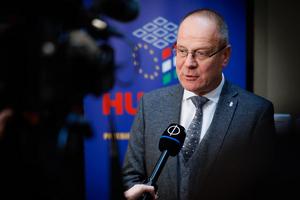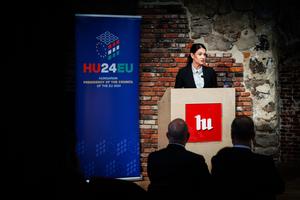The event Charting a Competitive Future: Priorities of the Hungarian EU Presidency 2024, held on November 6, 2024, in Brussels, provided a timely platform for discussing Hungary’s EU Presidency priorities, with a particular emphasis on European competitiveness, just two days before the European Council’s informal meeting in Budapest. The event was organized by the Europe Strategy Research Institute of Ludovika University of Public Service and the Liszt Institute of Brussels.
Hungarian Ambassador to Belgium, Tamás Iván Kovács, opened the event, stressing the need to bolster Europe’s competitiveness in an evolving global landscape.
Minister Tibor Navracsics delivered the keynote address titeled "Empowering Europe’s Regions: Competitiveness Through Cohesion", emphasizing the crucial link between cohesion policy and competitiveness in Europe. He highlighted the importance of resilience and adaptability to address the current global pressures, including rapid technological changes, shifting geopolitical dynamics, and environmental challenges. Cohesion policy, as the EU’s primary tool for investment, plays a key role in bridging economic disparities and helping all regions reach their potential by providing resources, skills, and opportunities.
The minister stressed that building a competitive EU requires tapping into the strengths of all regions, ensuring balanced growth, and reducing disparities. He pointed out that investments from the 2014–2020 and 2021–2027 periods are projected to boost the EU's GDP by nearly 1% by 2030, with even greater impacts in less-developed regions. Looking beyond 2027, continued investments in cohesion are needed to maintain regional balance and foster equal opportunities.
Addressing the issue of demographic change, the minister noted that many EU regions face challenges such as aging populations, migration, and labor shortages, particularly in rural areas. Cohesion policy must help these regions adapt, focusing on talent retention, social inclusion, and labor market flexibility to prevent the "talent development trap" of skilled youth leaving. The Hungarian Presidency has prioritized demography alongside cohesion and competitiveness, emphasizing local, place-based strategies to ensure that no region is left behind.
In conclusion, the minister called for cohesion policy to remain a driving force for regional and EU-wide competitiveness, while adapting to future challenges. The Hungarian Presidency is committed to these objectives, aiming for a prosperous, unified, and resilient Europe where all citizens have the opportunity to thrive.
The panel discussion, moderated by Viktória Lilla Pató, academic research fellow at the Europe Strategy Research Institute, discribed the upcoming Competitiveness Pact as a cornerstone initiative proposed by the Hungarian EU Presidency. Expected to be discussed at the informal meeting of European leaders on November 8 in Budapest, the Competitiveness Pact is envisioned as a five-year framework designed to reverse Europe's declining global competitiveness by advocating for reduced administrative burdens, affordable energy, and a green industrial policy aligned with broader EU objectives.
András Edelényi, member of the Employers’ Group in the European Economic and Social Committee, highlighted the importance of fair access to resources such as energy and data, which are essential for regional competitiveness and growth. He emphasized the need for the Competitiveness Pact to create a more streamlined regulatory environment that supports innovation and bridges the gap between research and production.
Sandra Parthie, head of the Brussels Liaison Office of the Institut der Deutschen Wirtschaft (German Economic Institute), emphasized the role of the Competitiveness Pact in reducing barriers within the internal market. She noted that over-regulation and restrictions on the movement of goods and services currently result in a 10% GDP loss for the EU, as cited in the Draghi Report. Ms Parthie called for a harmonized policy and funding framework to address these inefficiencies, promote economic growth, and foster better cooperation between member states and EU institutions. "We need a straightforward and less bureaucratic competitiveness fund—one unified fund, not many fragmented ones with differing criteria and administrative burdens," she stressed. Ms Parthie also highlighted the necessity of national and private investment, emphasizing that relying solely on EU funding is insufficient. She called for overcoming narrow national interests in favor of a broader European vision.
Bernadett Petri, head of the Europe Strategy Research Institute, stressed the importance of balancing both top-down and bottom-up approaches within the pact, ensuring that EU policies serve the needs of both major industries and local SMEs. She highlighted that while competitiveness is a key principle of the new Commission, local dimensions are still lacking. "Focusing only on top-level initiatives is misleading and runs counter to European principles," Ms Petri stated. She also noted that the pact's green industrial policy must consider its impact on small businesses, advocating for accessible funding and support that enables local enterprises to transition to sustainable practices without sacrificing economic viability. Ms Petri described a key novelty of Hungary's competitiveness priority as its bottom-up approach. She further emphasized that the milestone approach of EU funding programmes poses challenges for the CEE region and risks fragmenting the European Single Market. According to her, competitiveness must prioritize EU citizens, reduce administrative burdens in directly managed EU programs, and ensure that fund allocation respects territorial differences while strengthening cohesion.
After the insightful discussions, Minister Navracsics signed copies of the 2024 Hungarian EU Presidency volume, which he co-authored and co-edited. This event, organized under the EU Presidency Strategy of Ludovika University, provided a meaningful space for dialogue on the Competitiveness Pact, regional development, and Hungary’s strategic priorities in enhancing both national and European competitiveness on the global stage.
Pató Viktória Lilla, Taraczközi Anna







